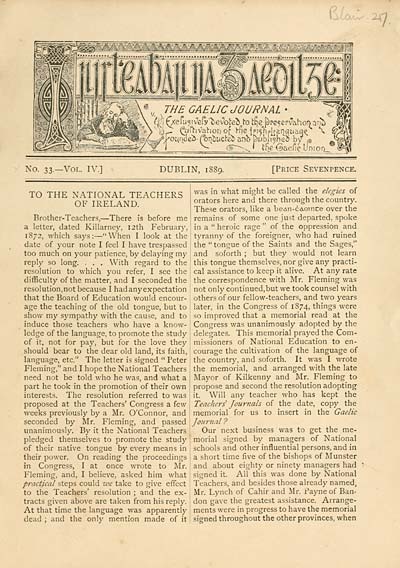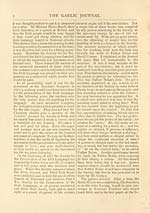Download files
Complete book:
Individual page:
Thumbnail gallery: Grid view | List view

^W vvy^-A °A A AA/WAA^ ■ ^^^^^7^ '\°Ay K'A'A^'A'rmam
r
.^^^.^^^
THE GAELIC JOURNAL
'-->, ' tfje <3 a( fie Udi
V^
JDIOQ_
No. 33,— Vol. IV.]
DUBLIN, 18S9.
[Price Sevenpence.
TO THE NATIONAL TEACHERS
OF IRELAND.
Brother-Teachers, — There is before me
a letter, dated Killarne}'-, I2th February,
1872, which says: — "When I look at the
date of your note I feel I have trespassed
too much on your patience, by delaying my
reply so long. , . . With regard to the
resolution to which you refer, I see the
difficulty of the matter, and I seconded the
resolution, not because I had any expectation
that the Board of Education would encour-
age the teaching of the old tongue, but to
show my sympathy with the cause, and to
induce those teachers who have a know-
ledge of the language, to promote the study
of it, not for pay, but for the love they
should bear to the dear old land, its faith,
language, etc." The letter is signed " Peter
Fleming," and I hope the National Teachers
need not be told who he was, and what a
part he took in the promotion of their own
interests. The resolution referred to was
proposed at the Teachers' Congress a few
weeks previously by a Mr. O'Connor, and
seconded by Mr. Fleming, and passed
unanimously. By it the National Teachers
pledged themselves to promote the study
of their native tongue by every means in
their power. On reading the pj-oceedings
in Congress, I at once wrote to Rlr.
Fleming, and, I believe, asked him what
practical steps could zve take to give effect
to the Teachers' resolution ; and the ex-
tracts given above are taken from his reply.
At that time the language was apparently
dead ; and the only mention made of it
was in what might be called the elegies of
orators here and there through the country.
These orators, like a beAn-cAoince over the
remains of some one just departed, spoke
in a " heroic rage " of the oppression and
tyranny of the foreigner, who had ruined
the " tongue of the Saints and the Sages,"
and soforth ; but they would not learn
this tongue themselves, nor give any practi-
cal assistance to keep it alive. At any rate
the correspondence with Mr. Fleming was
not only continued, but we took counsel with
others of our fellow-teachers, and two years
later, in the Congress of 1S74, things were
so improved that a memorial read at the
Congress was unanimously adopted by the
delegates. This memorial prayed the Com-
missioners of National Education to en-
courage the cultivation of the language of
the country, and soforth. It was I wrote
the memorial, and arranged with the late
Mayor of Kilkenny and Mr. Fleming to
propose and second the resolution adopting
it. Will any teacher who has kept the
Teachers Journals of the date, copy the
memorial for us to insert in the Gaelic
Journal ?
Our next business was to get the me-
morial signed by managers of National
schools and other influential persons, and in
a short time five of the bishops of Munster
and about eighty or ninety managers had
signed it. All this was done by National
Teachers, and besides those already named,
Mr. Lynch of Cahir and Mr. Payne of Ban-
don gave the greatest assistance. Arrange-
ments were in progress to have the memorial
signed throughout the other provinces, when
r
.^^^.^^^
THE GAELIC JOURNAL
'-->, ' tfje <3 a( fie Udi
V^
JDIOQ_
No. 33,— Vol. IV.]
DUBLIN, 18S9.
[Price Sevenpence.
TO THE NATIONAL TEACHERS
OF IRELAND.
Brother-Teachers, — There is before me
a letter, dated Killarne}'-, I2th February,
1872, which says: — "When I look at the
date of your note I feel I have trespassed
too much on your patience, by delaying my
reply so long. , . . With regard to the
resolution to which you refer, I see the
difficulty of the matter, and I seconded the
resolution, not because I had any expectation
that the Board of Education would encour-
age the teaching of the old tongue, but to
show my sympathy with the cause, and to
induce those teachers who have a know-
ledge of the language, to promote the study
of it, not for pay, but for the love they
should bear to the dear old land, its faith,
language, etc." The letter is signed " Peter
Fleming," and I hope the National Teachers
need not be told who he was, and what a
part he took in the promotion of their own
interests. The resolution referred to was
proposed at the Teachers' Congress a few
weeks previously by a Mr. O'Connor, and
seconded by Mr. Fleming, and passed
unanimously. By it the National Teachers
pledged themselves to promote the study
of their native tongue by every means in
their power. On reading the pj-oceedings
in Congress, I at once wrote to Rlr.
Fleming, and, I believe, asked him what
practical steps could zve take to give effect
to the Teachers' resolution ; and the ex-
tracts given above are taken from his reply.
At that time the language was apparently
dead ; and the only mention made of it
was in what might be called the elegies of
orators here and there through the country.
These orators, like a beAn-cAoince over the
remains of some one just departed, spoke
in a " heroic rage " of the oppression and
tyranny of the foreigner, who had ruined
the " tongue of the Saints and the Sages,"
and soforth ; but they would not learn
this tongue themselves, nor give any practi-
cal assistance to keep it alive. At any rate
the correspondence with Mr. Fleming was
not only continued, but we took counsel with
others of our fellow-teachers, and two years
later, in the Congress of 1S74, things were
so improved that a memorial read at the
Congress was unanimously adopted by the
delegates. This memorial prayed the Com-
missioners of National Education to en-
courage the cultivation of the language of
the country, and soforth. It was I wrote
the memorial, and arranged with the late
Mayor of Kilkenny and Mr. Fleming to
propose and second the resolution adopting
it. Will any teacher who has kept the
Teachers Journals of the date, copy the
memorial for us to insert in the Gaelic
Journal ?
Our next business was to get the me-
morial signed by managers of National
schools and other influential persons, and in
a short time five of the bishops of Munster
and about eighty or ninety managers had
signed it. All this was done by National
Teachers, and besides those already named,
Mr. Lynch of Cahir and Mr. Payne of Ban-
don gave the greatest assistance. Arrange-
ments were in progress to have the memorial
signed throughout the other provinces, when
Set display mode to: Large image | Transcription
Images and transcriptions on this page, including medium image downloads, may be used under the Creative Commons Attribution 4.0 International Licence unless otherwise stated. ![]()
| Early Gaelic Book Collections > Blair Collection > Gaelic journal > Volume 4, number 33 > (1) |
|---|
| Permanent URL | https://digital.nls.uk/79324506 |
|---|
| Description | No. 33, Vol. IV. 1889. |
|---|---|
| Shelfmark | Blair.217 |
| Attribution and copyright: |
|
| Description | A selection of books from a collection of more than 500 titles, mostly on religious and literary topics. Also includes some material dealing with other Celtic languages and societies. Collection created towards the end of the 19th century by Lady Evelyn Stewart Murray. |
|---|
| Description | Selected items from five 'Special and Named Printed Collections'. Includes books in Gaelic and other Celtic languages, works about the Gaels, their languages, literature, culture and history. |
|---|
